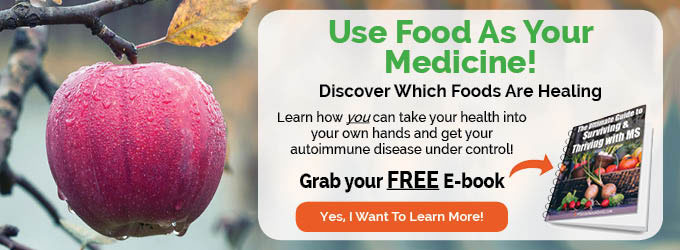Last Updated on December 5, 2023 by Cathy

Researchers believe people with multiple sclerosis (MS) may have a genetic predisposition. Not that it’s a guarantee you’ll get MS. They believe environmental factors are 70% responsible for triggering MS. Changing your lifestyle is the key to recovering from MS.
Chronic inflammation is the underlying cause of MS but what that means is still a mystery. Since everyone is different each approach is going to be different. There are many diets for MS and I don’t believe only one diet works for everyone. Although, it’s important to eat an anti-inflammatory and nutrient-dense diet. A poor diet is a culprit but if you don’t fix the other problems you won’t be able to get your body to fully heal.
Triggers to MS:
- Poor Diet
- Infections (bacteria, parasites, viruses, and yeast overgrowth)
- Environmental toxins (heavy metals, mold, pesticides, etc.)
- Chronic stress
- Hormones (adrenaline, cortisol, etc.)
I’ve kept my MS in remission for over thirteen years. It was years later when I realized what my trigger was, so I worked on removing it. For me, it was a severe yeast overgrowth thanks to antibiotics and a diet of processed foods and refined sugar. I changed my diet and started taking antifungals and my old symptoms began to reverse.
Healing the central nervous system is one of the slowest systems in the body to heal. Don’t get discouraged, everyone is different. Don’t compare yourself to someone else. For some people it may take one year for others it may take four years. Fortunately for me, my heat intolerance disappeared pretty quickly. I had suffered from that for over twenty years. But, I’m still working on a few stubborn symptoms I want to reverse.
Start today so you won’t regret it later.
Lifestyle Choices
You may be eating the perfect diet. However, your lifestyle habits could be keeping you from healing. Stress is a huge factor. It’s known that stress can bring on an MS flare and it can make MS progress faster. In today’s world, you can’t avoid stress but you can learn ways to manage it. Like meditation, listening to music, yoga, soaking in a tub, or reading a good book.
Low vitamin D is another link to MS, so it’s important to get your levels checked. The first time I was tested the result was normal, the number was 34 ng/mL which is low. Conventional doctors consider 30-100 ng/mL to be normal. Don’t except a “normal” from your doctor, get the actual number, it should be between 60-100 ng/mL.
Environmental Toxins
Environmental toxins are everywhere, it’s impossible to remove all of them. However, the more you remove the fewer toxins your body has to detox. Researchers discovered farm workers were more likely to die from an autoimmune disease. The reason was due to them working in fields sprayed with pesticides.
Your lifestyle is the key to your recovery.
Amalgam fillings (silver) are a known trigger to fatigue, depression, and MS. Mercury is a toxic heavy metal that damages the immune system. Repeated exposure to mercury intensifies brain damage in MS through mitochondrial dysfunction. Speak to a specialist who is properly trained to remove amalgam fillings.
Pay attention to the toxins you’re putting on your skin. The average woman uses twelve products on her body containing 168 different ingredients. Men use an average of six products each day. Including bath soap, deodorant, lotions, makeup, and colognes.
The Environmental Working Group has an app called Healthy Living you can download (see image below). It allows you to scan different products such as coffee or sunscreen and gives you a safety rating.

Detoxify Toxins Around Your House
Start using natural products to clean your house. Everyday products like baking soda and vinegar are excellent for cleaning. Include essential oils to give a home a fresh scent, and open windows to let fresh air indoors. Stop using harmful pesticides and herbicides around your house. They’re not only harmful to you but they’re harmful to your pets.
Stop smoking, smoking not only hurts your lungs but it increases a person’s risk of developing MS. It also causes the disease to progress faster than for non-smokers. It’s never too late to stop smoking. Studies revealed MS progression slowed for ex-smokers at the same rate as non-smokers. If you need help to quit smoking, check out Smoke-Free for free resources.
Exercise not only helps your immune system but it also helps your body to remove toxins. Stretching, yoga, walking, and swimming are great exercises. If you struggle with drop foot, balance, or spasticity check out OptimalBody Personal Fitness. They even have exercises for people in wheelchairs.
Stay Positive
Avoid toxic people, if you are constantly around negativity it brings you down. Hang around people who are optimistic and make you laugh. Like the saying goes “Laughter is the best medicine.” If you need help with depression talk to someone or see a counselor.
Stay positive, and do something that cheers you up. Don’t compare yourself with others, even a small win is a victory. When the “pins-and-needles” sensation left my feet I was thrilled. No one could see it but I could feel it.
You may also enjoy reading:
Environmental Toxins in Your Home
Removing Environmental Toxins
What Is Green Cleaning?
The Ultimate Guide to Surviving & Thriving with MS
Unlock the power of a healthy lifestyle with this exclusive ebook! Discover practical strategies and expert advice on managing MS naturally through nutritious eating and mindful living. This comprehensive guide is packed with wellness tips, and lifestyle recommendations tailored specifically for you. Take control of your health and embark on a transformative journey toward a balanced and vibrant life. Get your hands on this invaluable resource and start thriving today!







